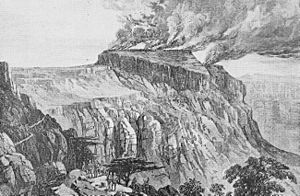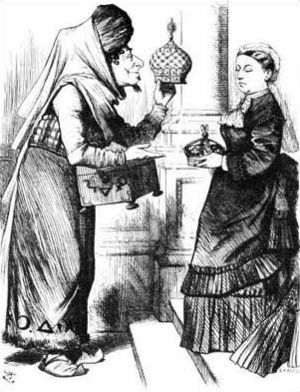Premierships of Benjamin Disraeli facts for kids
Quick facts for kids |
|
| Premierships of Benjamin Disraeli | |
|
Monarch
|
|
|---|---|
|
The Earl of Beaconsfield
|
|
| Party | Conservative |
| Seat | 10 Downing Street |
|
First term 27 February 1868 – 1 December 1868 |
|
| Cabinet | Third Derby–Disraeli ministry |
|
|
|
|
Second term 20 February 1874 – 21 April 1880 |
|
| Cabinet | Second Disraeli ministry |
| Election | 1874 |
|
|
|
|
|
|
Benjamin Disraeli, 1st Earl of Beaconsfield, was a famous British politician. He led the Conservative Party and served as Prime Minister twice. His first time as leader was in 1868. He then served a longer term from 1874 to 1880.
Contents
First Time as Prime Minister (1868)
In February 1868, the Prime Minister, The Earl of Derby, became very ill. He was advised by doctors to step down. He asked Benjamin Disraeli, who was in charge of the country's money at the time, if he was ready to become Prime Minister. Disraeli said yes, famously saying he had "climbed to the top of the greasy pole". This meant he had reached the highest position in politics.
Disraeli's government was not very strong at first. However, he still managed to pass some important laws.
- The Public Schools Act 1868 created a board to manage nine important English schools.
- The Telegraph Act 1868 allowed the Post Office to take control of all telegraph companies. This made communication easier for everyone.
- The Capital Punishment Amendment Act 1868 stopped public executions. This meant that executions would no longer be carried out in front of crowds.
Disraeli also set up a special group to look into health laws. This group was led by Sir Charles Adderley. Another important law was the Parliamentary Elections Act 1868. This law changed how problems with elections were handled. Instead of politicians deciding, judges would now investigate election issues. This made the process fairer.
The main issue at home was the role of the Anglican Church in Ireland. It was the official church, but only a small number of people in Ireland belonged to it. This became a big topic for the next election.
Foreign Affairs in 1868

In April 1868, good news arrived from Abyssinia (modern-day Ethiopia). A British army, led by Sir Robert Napier, had defeated the forces of Emperor Theodore II. They successfully freed British prisoners, including the British envoy and consul.
Disraeli praised Napier and his army in Parliament. He spoke of their amazing journey, leading elephants and artillery over difficult African mountains. He said they had to climb a fortress that seemed impossible to conquer. Disraeli famously declared that "the standard of St. George was hoisted on the mountains of Rasselas." This meant the British flag was flying high.
The expedition was expensive. It cost more than expected, but Disraeli believed it was worth it. He wrote that it was a "noble feat of arms" that greatly improved Britain's reputation in the East. He felt that success was more important than the money spent.
Second Time as Prime Minister (1874–1880)
Disraeli's second time as Prime Minister began with a debate about religious practices in the Church of England. Many people wanted laws to control "Ritualism," which involved practices similar to Roman Catholicism. The Public Worship Regulation Bill was introduced.
Disraeli supported the Bill. He said he respected Roman Catholicism for Roman Catholics, but he did not like "Mass in masquerade" within the Church of England. The Bill aimed to stop these Ritualistic practices. It passed through Parliament, though there were some disagreements about how much power bishops should have. Disraeli argued that the law was needed to control a "small but harmful group."
Disraeli and Queen Victoria were very close. The Queen wanted a new imperial title, as her daughter had one in Germany. The Royal Titles Bill was passed, which added "Empress of India" to the British monarch's official title. This meant Queen Victoria was now Queen of the United Kingdom and Empress of India.
Even though some politicians disagreed, the law passed. Disraeli wanted the world to know that Britain would keep control of India. He believed that grand titles could help inspire nations.
Social Improvements
Disraeli's government focused on improving the lives of ordinary people. This program of social reform began in 1874–75. His Home Secretary, Richard Cross, played a big role. Disraeli's motto was "Sanitas sanitatum, omnia sanitas" (Health of health, all is health). He believed that improving health included many good things for society.
One major area was housing for working-class people.
- The Artisans' and Labourers' Dwellings Improvement Act 1875 allowed local councils to tear down unhealthy slum buildings. They could then build new, better homes for workers. Councils had to pay the previous owners. Later, an amending law was passed to make it easier for councils to do this.
The government also helped people save money.
- The Friendly Societies Act 1875 helped friendly societies (groups that offered insurance and savings to members). This law made sure these societies were well-managed and financially stable. It helped protect people's savings.
Disraeli's government also improved laws about work.
- The Employers and Workmen Act 1875 changed how broken work contracts were handled. Before, if a worker broke a contract, it was a crime. If an employer broke one, it was just a civil matter. This new law made both workers and employers equal in the eyes of the law for contracts.
- The Conspiracy and Protection of Property Act 1875 made it legal for trade unions to peacefully protest.
Disraeli believed these laws would make working-class people support the Conservative Party. A trade union guide called these two laws "the charter of the social and industrial freedom of the working classes."
Other important laws included:
- The Public Health Act 1875, which brought together earlier laws on public health.
- The Factory Act 1878, which combined all previous factory laws. This law was praised by Lord Shaftesbury, a long-time supporter of factory reforms.
- A Factory Act in 1874 had already reduced the working day for women and children to ten hours on weekdays and six hours on Saturdays.
- The Rivers Pollution Prevention Act 1876 stopped solid waste from flowing into rivers. It also made factories clean their liquid waste before it entered rivers.
Foreign Policy Achievements
Disraeli and his foreign minister, Lord Derby, achieved several important things in foreign policy.
Suez Canal Purchase
In 1875, the ruler of Egypt, known as the Khedive, was in financial trouble. He needed to sell his shares in the Suez Canal. This canal was very important for Britain, as four-fifths of its traffic was British ships. Disraeli quickly bought 176,602 shares, which was 44% of the Canal's total.
This purchase did not give Britain full ownership, but it gave them a strong say in how the Canal was run. It also protected Britain's interests. The investment was very profitable. The shares, bought for £4 million, were worth over £40 million by 1914. Disraeli made this decision quickly, without asking Parliament first. Even though some politicians disagreed, the public loved the idea. Other European countries were impressed, seeing it as a sign that Britain was becoming more active in world affairs.
The Eastern Question
The "Eastern Question" was about what would happen to the Ottoman Empire (a large empire in decline) as it grew weaker. Russia wanted to take parts of it, especially areas that would give them access to the Mediterranean Sea. Like previous British leaders, Disraeli believed that a strong Ottoman Empire was important to stop Russia from expanding. He feared Russian expansion could threaten the British Empire's route to India.
Disraeli wanted to stop Russia in the Balkans without going to war. Meanwhile, Gladstone and other Liberal politicians were criticizing Turkey for its harsh treatment of Christian communities in the Balkans. Disraeli knew defending the Ottomans was risky. However, he publicly stated that Britain's interests in the East were as important as any other country's.
When the Russo-Turkish War began in 1877, Disraeli's government declared Britain neutral. This meant Britain would not take sides, as long as its national interests were protected. These interests included the safety of the Suez Canal and Egypt, and making sure Russia did not invade Constantinople. Russia agreed to these terms.
Later, when Russia advanced towards Adrianople, Disraeli's government sent the British navy to Constantinople. Parliament also agreed to raise £6 million for military use. This caused excitement and strong patriotic feelings in Britain, leading to the term "jingoism" to describe aggressive patriotism.
However, when Russia and the Ottomans signed the Treaty of San Stefano in March 1878, Disraeli's government found it unacceptable. They believed it gave Russia too much power. Disraeli insisted that any European meeting about the treaty must allow for changes to it. He got his government's approval to call up military reserves and send Indian soldiers to the Mediterranean.
This led to the Congress of Berlin, a meeting of Europe's most powerful leaders from June to July 1878. Disraeli was a central figure at the Congress. He achieved his goals regarding Bulgaria by threatening to leave the meeting if his demands were not met. Russia eventually gave in. During the Congress, it was announced that Cyprus would be given to Britain by the Ottoman Empire. This was a surprising move that brought attention back to Disraeli. At the end, the leaders signed the Treaty of Berlin.
When Disraeli returned to England, he was met with huge crowds and patriotic songs. He famously declared that they had brought back "Peace with Honour" from Berlin. He told Parliament that the treaty and the Cyprus agreement had protected the British Empire and removed the threat to European independence. He explained that taking Cyprus was important for protecting Britain's route to India.
Historians generally agree that Disraeli's foreign policy was very successful. The Berlin agreement led to a long period of peace between the major European powers.
Loss in the 1880 Election
Disraeli's focus on foreign affairs and less attention to problems at home eventually cost him his position. In the 1880 election, Gladstone strongly attacked Disraeli's foreign policy, calling it immoral.
Disraeli, now known as Lord Beaconsfield, was in the House of Lords. This meant he could not actively campaign. His party struggled to respond to Gladstone's strong criticisms. While Disraeli had improved the Conservative Party's organization, he was more connected to the countryside and did not fully understand the growing importance of the urban middle class in his party.
Besides foreign policy, the Conservatives also struggled to defend their economic record. The 1870s saw a worldwide economic slowdown. Prices and profits fell, and jobs were lost. This caused hardship for working-class people. Britain's free trade system meant cheap wheat from North America flooded the market, made worse by a very bad harvest in Britain in 1879.
The party in power usually gets blamed for economic problems. The Liberals kept pointing out the growing budget deficit as a sign of poor management. In the election, Disraeli's party lost many seats, especially in Scotland, Ireland, and urban areas. The Conservative Party's strength dropped significantly, while the Liberals gained many seats. Disraeli resigned on April 21, 1880.
 | Emma Amos |
 | Edward Mitchell Bannister |
 | Larry D. Alexander |
 | Ernie Barnes |



